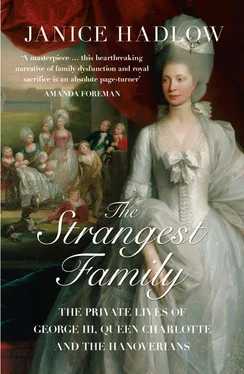Augusta’s willingness to please extended not just to what she said but also to what she did. She patiently indulged her husband in all his interests and foibles; in return, he found a place for her at the centre of his life. She accompanied him on all his excursions. Sometimes twice a week, they went to formal masquerades at Ranelagh pleasure gardens, where the princess, usually very modestly dressed, appeared ‘covered with diamonds’. Augusta gamely joined her husband in his pursuit of less grand entertainments. They went together to investigate the infamous Cock Lane Ghost, whose alleged spectral manifestation drew large crowds nightly (though the spirit failed to appear for them). She was also a dutiful participant in the pranks that Frederick enjoyed so much, reacting with the expected surprise when taken by him to visit a fortune teller, who turned out to be their children’s dancing master in heavy disguise. The politician George Dodington, who occupied a prominent place in the prince’s entourage, joined them on a typical day out in June 1750: ‘To Spitalfields, to see the manufactures of silk, and to Mr Carr’s shop in the morning. In the afternoon, the same company … to Norwood Forest to see a settlement of gypsies. We returned and went to Bettesworth the conjuror’s in hackney coaches – not finding him, we went in search of the little Dutchman, but were disappointed; and concluded by supping with Mrs Cannon, the princess’s midwife.’ 9
If the princess found Frederick’s pursuit of the eccentric and the exotic exhausting, she would never have said so. Perhaps she took more pleasure in their shared botanical interests. She and Frederick laid out the foundations of what is now Kew Gardens, jointly commissioning a summerhouse in the fashionable Chinese style, decorated with illustrations of the life of Confucius. Like her mother-in-law, Augusta’s only real extravagance was her spending on the gardens, where she built on the work Caroline had begun, erecting an orangery and completing the famous pagoda.
She played a less significant part in her husband’s other interests. For all his enduring fascination with low-life, Frederick was also a sophisticated consumer of high culture and keen to be seen as an urbane and discerning man of taste. He was a patron of the architect William Kent, and employed him to remodel the interior of his houses in his severe, classical style. In contrast to his father’s boasted indifference to the quality of the paintings that hung on his walls, Frederick was a thoughtful collector of pictures, buying two Van Dycks and two landscapes by Rubens. Horace Walpole, who was not well disposed to the prince, regarded his artistic ambitions as mere pretension until Frederick asked to see the catalogue Walpole had drawn up of his father’s extensive art collection at Houghton Hall in Norfolk. To his surprise, Walpole was impressed by the prince’s knowledge and appreciation: ‘He turned to me and said such a crowd of civil things that I did not know what to answer; he commended the style of quotations; said I had sent him back to his Livy.’ 10
Frederick was his mother’s son in his respect for intellectuals, if in little else. Like her, he enjoyed the company of writers. A keen amateur author himself (besides the poem written for Augusta and the disastrous play co-written with Hervey, he had a host of other works to his name), he sought out the company of John Gay, whose Beggar’s Opera , with its attack on Robert Walpole and the king, was attractive to him both culturally and politically, and James Thomson, whose poem The Seasons was hugely popular in the 1730s, and often visited Alexander Pope at his home in Twickenham. When Pope fell asleep in the middle of one of Frederick’s disquisitions on literature, the prince was not offended but stole discreetly away.
Built on the foundation of their stable marriage, and enlivened by the energy and diversity of the prince’s interests, Frederick and Augusta’s household was a comparatively happy place in which to raise children. It was certainly an improvement on Frederick’s, or indeed on his father’s, experiences of childhood. There seems little doubt that this was a conscious effort on Frederick’s part; he was determined to create for his own family the life he had never enjoyed himself as a boy. He was an attentive and affectionate parent, who enjoyed the company of his wife and children and was not afraid to show it. ‘He played the part of the father and husband well,’ wrote one appreciative visitor, ‘always happy in the bosom of his family, left them with regret and met them again with smiles, kisses and tears.’ 11When the Bishop of Salisbury went to dinner with Frederick and Augusta, he was impressed to see that afterwards the children were called in, ‘and were made to repeat several beautiful passages out of plays and poems’ whilst their proud parents looked on. Beguiled by this unaccustomed image of royal family harmony, the bishop declared ‘he had never passed a more agreeable day in his whole life’. 12Frederick was particularly attached to his two eldest boys. When he was away, he was a diligent correspondent, his letters suffused with a warm informality. Writing to ‘dear George’ in 1748, he signed himself ‘your friend and father’. To ‘dear Edward’ he ‘rejoiced to find that you have been so good both. Pray God it may continue. Nothing gives a father who loves his children so well as I do so much satisfaction as to hear they improve, or are likely to make a figure in this world.’ 13‘Pray God,’ he once wrote, more wistfully, ‘that you may grow in every respect above me – good night, my dear children’. 14
Frederick involved himself in every aspect of his children’s lives. In the country, whether at Kew or Cliveden, he arranged sports for them. There were skittles and rounders – played inside the house if wet, amidst the formal elegance of William Kent’s interiors. Everyone, including the girls, played cricket. All visitors were expected to join in, with neither age, dignity nor excess weight conferring exemption. When the rotund politician Dodington visited Kew in October 1750, he found himself reluctantly conscripted into a game. Further exercise for the royal children was provided by gardening. Each of them had a small plot to tend, but tilling the soil was not confined to the young. Here too, as the unhappy Dodington discovered, guests were compelled to do their bit, hoeing and digging with the rest of the family. ‘All of us, men, women and children worked at the same place,’ Dodington noted on 28 February 1750, adding the mournful postscript, ‘Cold dinner.’ 15Having endured the perils of the cricket pitch and the rigours of the garden plot, visitors were also expected to join willingly in the practical jokes and horseplay for which Frederick never lost his taste. Dodington, who was almost as fat as he was tall, once allowed Frederick to wrap him in a blanket and roll him downstairs. The prince’s inner circle was not a place where ambitious politicians could expect to stand on their dignity.
In the evenings, the prince staged elaborate nightly theatricals in which all the family took part. Dodington recorded each night’s offering in his diary; the range of works was extensive, encompassing the classics – Macbeth , Tartuffe , Henry IV – to forgotten lighter pieces such as The Lottery or The Morning Bride . James Quin, a London actor, was recruited to coach the royal children in their performances. Many years later, when George III made his first speech from the throne as king, Quin commented with pride that ‘’Twas I that taught the boy to speak.’ 16One of Frederick’s favourite pieces was Addison’s Cato , whose Prologue, with its enthusiastic endorsement of the principles of political liberty, was usually given to the young George to recite, as he did for the first time in 1749 at the age of eleven.
Читать дальше












